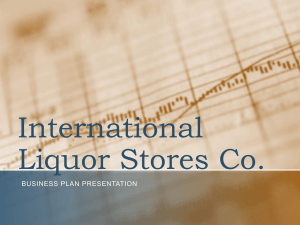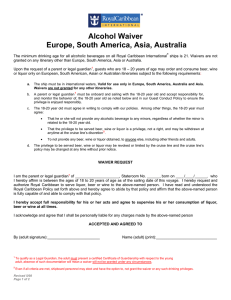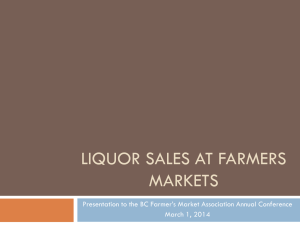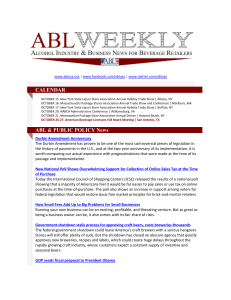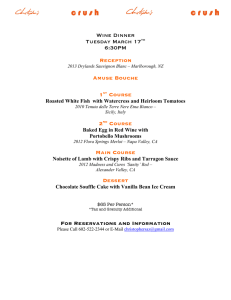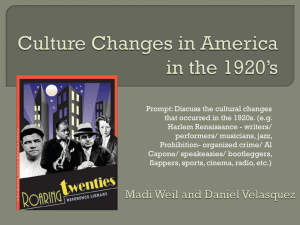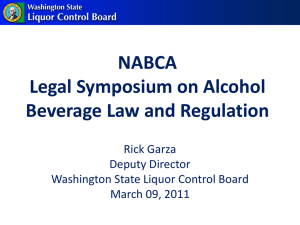RTF format
advertisement
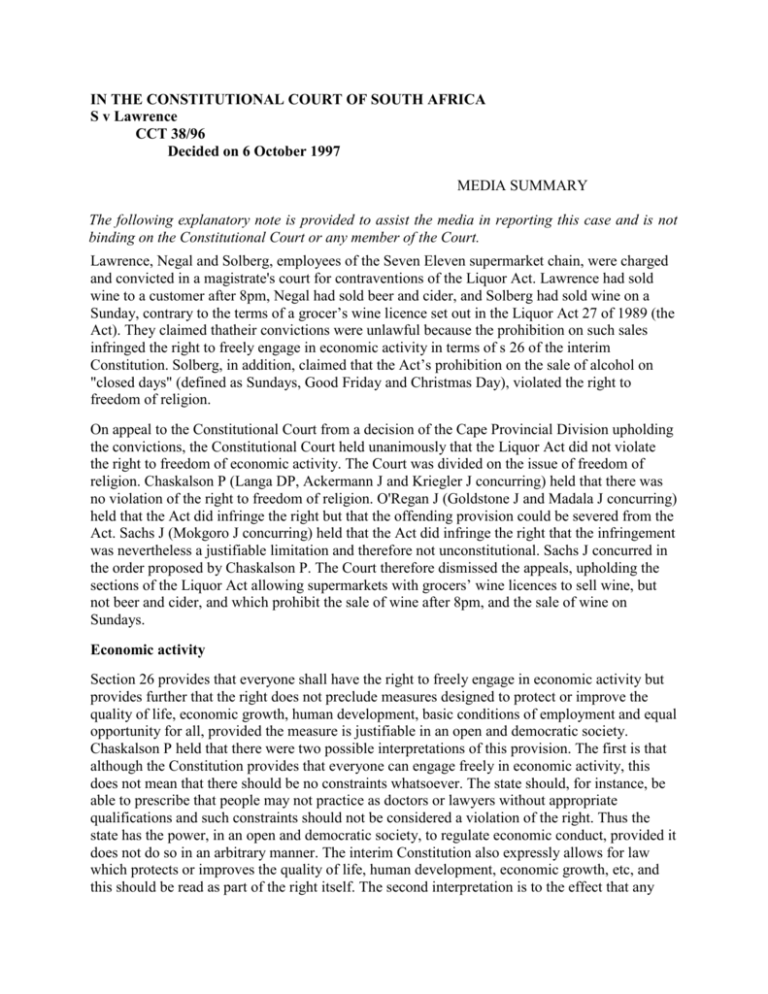
IN THE CONSTITUTIONAL COURT OF SOUTH AFRICA S v Lawrence CCT 38/96 Decided on 6 October 1997 MEDIA SUMMARY The following explanatory note is provided to assist the media in reporting this case and is not binding on the Constitutional Court or any member of the Court. Lawrence, Negal and Solberg, employees of the Seven Eleven supermarket chain, were charged and convicted in a magistrate's court for contraventions of the Liquor Act. Lawrence had sold wine to a customer after 8pm, Negal had sold beer and cider, and Solberg had sold wine on a Sunday, contrary to the terms of a grocer’s wine licence set out in the Liquor Act 27 of 1989 (the Act). They claimed thatheir convictions were unlawful because the prohibition on such sales infringed the right to freely engage in economic activity in terms of s 26 of the interim Constitution. Solberg, in addition, claimed that the Act’s prohibition on the sale of alcohol on "closed days" (defined as Sundays, Good Friday and Christmas Day), violated the right to freedom of religion. On appeal to the Constitutional Court from a decision of the Cape Provincial Division upholding the convictions, the Constitutional Court held unanimously that the Liquor Act did not violate the right to freedom of economic activity. The Court was divided on the issue of freedom of religion. Chaskalson P (Langa DP, Ackermann J and Kriegler J concurring) held that there was no violation of the right to freedom of religion. O'Regan J (Goldstone J and Madala J concurring) held that the Act did infringe the right but that the offending provision could be severed from the Act. Sachs J (Mokgoro J concurring) held that the Act did infringe the right that the infringement was nevertheless a justifiable limitation and therefore not unconstitutional. Sachs J concurred in the order proposed by Chaskalson P. The Court therefore dismissed the appeals, upholding the sections of the Liquor Act allowing supermarkets with grocers’ wine licences to sell wine, but not beer and cider, and which prohibit the sale of wine after 8pm, and the sale of wine on Sundays. Economic activity Section 26 provides that everyone shall have the right to freely engage in economic activity but provides further that the right does not preclude measures designed to protect or improve the quality of life, economic growth, human development, basic conditions of employment and equal opportunity for all, provided the measure is justifiable in an open and democratic society. Chaskalson P held that there were two possible interpretations of this provision. The first is that although the Constitution provides that everyone can engage freely in economic activity, this does not mean that there should be no constraints whatsoever. The state should, for instance, be able to prescribe that people may not practice as doctors or lawyers without appropriate qualifications and such constraints should not be considered a violation of the right. Thus the state has the power, in an open and democratic society, to regulate economic conduct, provided it does not do so in an arbitrary manner. The interim Constitution also expressly allows for law which protects or improves the quality of life, human development, economic growth, etc, and this should be read as part of the right itself. The second interpretation is to the effect that any constraint upon economic activity infringes the right to free economic activity, unless it protects or improves the quality of life, human development, economic growth or any of the other purposes expressly permitted by the interim Constitution. The Court adopt the second interpretation in this case. The Court held that the purpose of the Act is to control the sale of liquor and that this is achieved by means of the system of licences. Although the Court recognised that the licencing system does constrain economic activity it noted that liquor is a potentially harmful substance. Excessive consumption of liquor is linked to crime, disturbance of the public order, impairment of road safety and other serious social and economic consequences. The controls in the Act were therefore designed to protect or improve the quality of life. The Court rejected an argument that restrictions on the hours of sale did not help reduce liquor consumption and its related problems, were ineffective and therefore irrational. According to the Court, controlling the availability of liquor is an internationally recognised means of combatting the problems of excessive liquor consumption and one of its strongest proponents is the World Health Organisation. The Court therefore concluded that there was a rational basis for a restriction on the hours of sale, and it therefore did not infringe the right to freely engage in economic activity. For the same reasons the Court also rejected an argument that restrictions on the sale of liquor on Sundays infringed the right to engage freely in economic activity. The Court also dismissed an argument that the terms of the grocer’s wine licence, which allows supermarkets to sell table wine, but not beer or cider, violates the right to engage freely in economic activity. The Act generally prohibits the sale of liquor on premises where other business, trade or occupation is conducted and the grocer’s wine licence is an exemption from this general restriction. Thus the Court held that the section which sets out what type of liquor can be sold under a grocer’s wine licence is really an extension of a grocery store’s right to trade in liquor, rather than a restriction on what type of liquor it may sell. It pointed out that it could not broaden the exception further, and in effect change the grocer’s wine licence of the Liquor Act into a ‘wine, beer and cider licence’. That would amount to the Constitutional Court passing legislation, something which it is not allowed to do. Religion It was argued the restriction in the Liquor Act induced people to submit to a Christian conception of proper conduct on Sundays as well as Good Friday and Christmas Day which was inconsistent with the freedom of religion of those who do not hold such beliefs nor wish to adhere to them. Chaskalson P defined the freedom of religion as the right to entertain any religious beliefs that a person chooses, the right to state those beliefs without fear of reprisal, and the right to show those beliefs by worship. It also involves an absence of coercion or constraint. He stressed that freedom of religion is impaired if people are forced to act in a manner contrary to their religious beliefs. He observed that this may done in subtle ways. He pointed out, however, that Sundays in South Africa have acquired a secular character. It is the day of the week on which most people do not work. In this context he examined the purpose and effect of the challenged part of the Liquor Act and held that it did not impose any coercion or constraint. It does not compel the holder of a grocer’s wine licence, or any other person, to observe the Christian sabbath, or prevent them from entertaining or manifesting such religious beliefs as they choose. Nor does it force grocery stores to open or close for business on Sundays. He concluded that if there is any connection between the Act’s restriction on the sale of liquor on Sundays and a promotion of the Christian religion it is too tenuous for the Court to conclude the right to freedom of religion had been infringed. (Langa DP, Ackermann J and Kriegler J concurred in the judgment of Chaskalson P). O’Regan J held that because the purpose and effect of the prohibition of trade in wine at grocery stores on closed days was to give recognition to days of Christian significance and not to those of other religions, that the right to freedom of religion had been breached. Freedom of religion required the government to act even-handedly in relation to religion and not prefer one to the exclusion of others. She went on to decide that the government’s infringement of Ms Solberg’s right to freedom of religion and conscience was not reasonably justifiable, as the purpose and effect of the prohibition on Sunday trading in wine did not outweigh the harm caused by the limitation of the right. O’Regan J concluded that the unconstitutional words of the section could be severed from the rest of the provision in the Liquor Act. (Goldstone J and Madala J concurred in the judgment of O’Regan J). Sachs J found that the relevant provision of the Liquor Act limited the right to freedom of religion, but considered the limitation to be justifiable under the limitations clause. Sachs J held that a multi-faith, heterodox and open society underlies the interim Constitution. Accordingly, adopting the approach of the reasonable South African conscious of the values of openness and tolerance in the interim Constitution, he concluded that the identification of Sundays, Good Friday and Christmas Day as closed days for purposes of selling liquor infringes the right to freedom of religion in that it results in a negative symbolic endorsement by the state of the Christian religion by sends out a message of inclusion for some and exclusion for others. Sachs J held that historically the legislature has expressed a particular religious preference by clearly siding with Christianity. This resulted in the marginalisation of those of other faiths. Any endorsement by the state today of Christianity as a privileged religion not only disturbs the general principle of impartiality in relation to matters of belief and opinion, but also serves to activate memories of painful past discrimination and disadvantage based on religion. Although Sachs J found that the prohibition violated the right to freedom of religion, he felt that it did so in an indirect and marginal way and was thus justifiable in terms of the limitation clause of the Constitution. He held that the state interest in encouraging temperance on closed days is a powerful and legitimate one while the scope and intensity of the invasion of the freedom of religion is relatively slight. (Mokgoro J concurred in the judgment of Sachs J).
